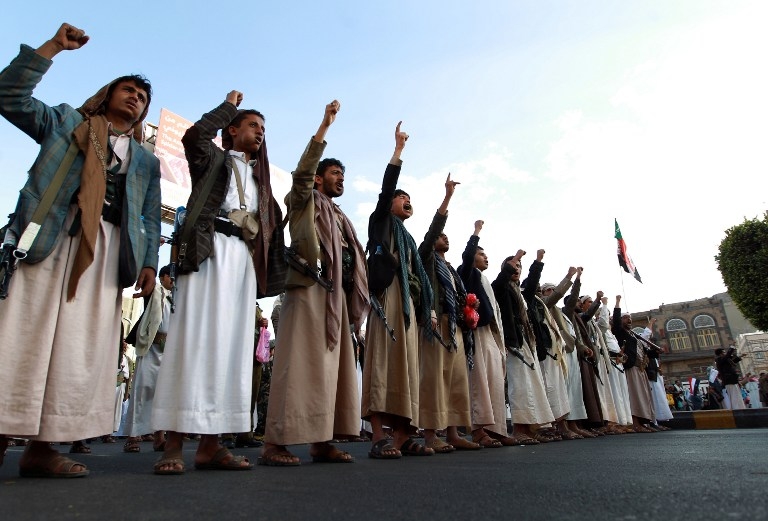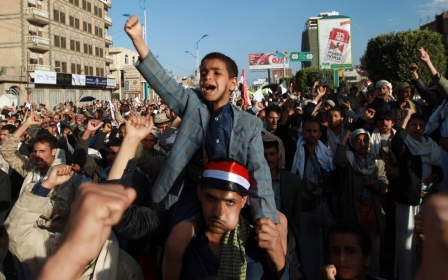Yemen's Houthis hold military drill near Saudi border

The Shiite Houthi militia that has seized power in Yemen's capital held military exercises near the border of Sunni heavyweight Saudi Arabia, their spokesman said Friday.
The spokesman, Mohammed Abdulsalam, also launched a verbal salvo against Riyadh, accusing it of interference.
"Thousands of soldiers belonging to army units based in northern Yemen participated Thursday afternoon in these manoeuvres, the first of this magnitude," Abdulsalam told AFP in a telephone interview from Baghdad, which he is visiting.
The size of the exercises could not be independently verified.
Yemen is strategically located next to oil-rich Saudi Arabia and on a key shipping route from the Suez Canal to the Gulf.
In recent years, Saudi Arabia supported the Houthis - with whom they once went to war - in order to combat the advance Yemen's Islamist group al-Islah and may view the growing Houthi strength as blowback from their earlier policy.
Abdulsalam said heavy weapons including tanks and artillery, captured by the Houthis as they spread their control across parts of Yemen, were used in the manoeuvres that took place in Kitaf, a town in the Houthis' northern stronghold of Saada province.
The drill aims to enhance capacity and to "raise the readiness" of the militia forces to prepare them to face "any incidents that might develop," he said, accusing Saudi Arabia of providing "al-Qaeda and jihadists with money, arms and logistical support."
Yemen is home to al-Qaeda in the Arabian Peninsula (AQAP) which, along with local Sunni tribes, has battled Houthi attempts to expand further south.
In a statement on Twitter, AQAP on Friday claimed responsibility for an attack on a building used by the Houthis as a headquarters in Rada, a town in central Yemen, saying its militants had killed "more than 20 Houthis".
'Yemen has changed'
"These manoeuvres are a message of peace for all except those threatening Yemenis by supporting takfiri (Sunni radical) elements," Abdulsalam said.
Yemen's mostly Sunni Gulf neighbours, led by Saudi Arabia, are deeply suspicious of the Houthis, fearing they will take Yemen into the orbit of Iran which has been openly backing the Houthis.
The six Gulf Cooperation Council (GCC) states accused the Houthis of a coup when the militia dissolved the government and parliament on 6 February.
They had earlier seized the presidential palace and besieged the residence of Western- and Gulf-backed President Abd Rabbuh Mansour Hadi.
Hadi was held under house arrest but later escaped and fled to Aden, declaring through an aide last week that the southern port city was now Yemen's capital.
Riyadh "has not yet realised that Yemen has changed and rejects hegemony," Abdulsalam said.
"Saudi Arabia must understand that the Yemeni people will defend their sovereignty and will not accept" foreign interference, said Abdulsalam, accompanied by a Houthi delegation.
They have visited "Tehran, Beirut, and a Gulf country," he said, refusing to identify the GCC member that has hosted the Houthis.
The Houthis fought six wars with the Yemeni government between 2004 and 2010 during the rule of former strongman Ali Abdullah Saleh. In 2009, Saudi Arabia attacked Houthi positions in northern Yemen.
A key US ally in the fight against al-Qaeda, Yemen has descended into chaos since the 2012 ouster of Saleh, who has been accused of backing the Houthis.
The GCC has agreed to a proposal by Hadi that Saudi Arabia host talks aimed at pulling Yemen out of its crisis, but the Houthis have so far opposed dialogue outside of Yemen.
On Friday, hundreds of people rallied in militia-controlled Sanaa to call for presidential elections and demand that Saleh's son Ahmed runs as a candidate.
Stay informed with MEE's newsletters
Sign up to get the latest alerts, insights and analysis, starting with Turkey Unpacked
Middle East Eye delivers independent and unrivalled coverage and analysis of the Middle East, North Africa and beyond. To learn more about republishing this content and the associated fees, please fill out this form. More about MEE can be found here.




